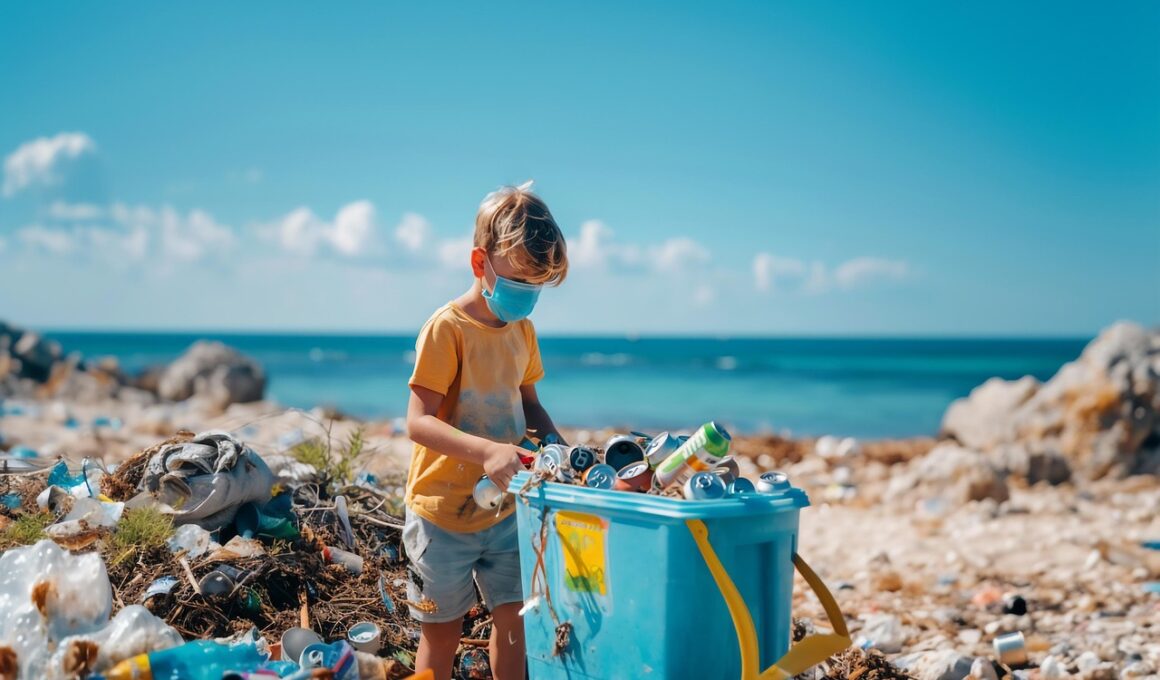Beach Clean-Ups Combined with Fitness: A New Trend in Sustainable Tourism
In recent years, a fascinating trend has emerged in the travel world, combining fitness activities with environmental conservation. Beach clean-ups, often organized in conjunction with outdoor fitness classes, have gained popularity among tourists who desire more meaningful vacation experiences. This combination allows participants to exercise while contributing to the maintenance of pristine natural environments. In beach locations around the globe, fitness enthusiasts come together to engage in activities like yoga, running, and beach volleyball. After these activities, they join forces to clean beaches, collecting litter and debris that tarnish the coastal landscape. Many travelers are looking to align their values with their actions, aiming to leave destinations cleaner than they found them. Tourists who participate in such clean-up initiatives report not only a strong sense of accomplishment but also camaraderie among fellow participants. These events serve as an excellent opportunity for community engagement, fostering connections between visitors and local residents. Ultimately, beach clean-ups combined with fitness promote a cycle of responsible tourism that prioritizes environmental health and enhances travelers’ well-being during their vacations.
The Benefits of Participating in Beach Clean-Ups
Participating in beach clean-ups has numerous benefits, both for the individuals involved and the environment. First and foremost, these events foster a sense of community spirit, bringing together like-minded individuals passionate about preserving nature. Many participants find joy in making new friends during these organized events, developing connections that often extend beyond the clean-up day. Physically, engaging in outdoor activities while cleaning the beach serves as an excellent workout that boosts cardiovascular fitness. Picking up trash, walking, or jogging along the shore provides a full-body workout that promotes physical health. Additionally, mental health benefits abound, as spending time outdoors and being active reduces stress levels and enhances mood. Such activities also provide valuable life lessons in sustainability, inspiring participants to adopt eco-friendly habits in their everyday lives. As participants witness the impact of their efforts, they become advocates for a cleaner planet. Not only do clean-ups leave beaches pristine, but they also spark conversations about broader environmental issues, driving awareness and change. The combination of fitness and environmental stewardship creates a rewarding experience for all involved.
Those planning to participate in beach clean-ups often have unique experiences and stories to share. Many clean-up events are organized by local nonprofits or community groups, allowing travelers to learn about local initiatives aimed at sustainability. This exposes tourists to vital issues impacting coastal ecosystems, such as pollution, over-tourism, and wildlife protection. Such awareness can have lasting impacts, inspiring individuals to advocate for environmental conservation beyond the vacation timeline. Additionally, participating in these activities presents learning experiences about the different types of waste collected. From plastic straws to discarded fishing nets, participants gain insight into how human actions disrupt marine life. Many organizations offer educational sessions and workshops alongside the clean-up, teaching participants about the importance of reducing single-use plastics, recycling, and responsible travel practices. The hands-on involvement creates an opportunity to engage with experts who can answer questions and provide additional resources. This continuous relationship between tourism and environmental responsibility empowers individuals to lead by example, helping to educate their communities when they return home. Engaging with nature directly strengthens this bond, fostering a desire to protect our planet.
Responsible Travel Choices
When embarking on a journey focused on sustainable tourism, making responsible travel choices becomes essential. Tourists can research local organizations offering beach clean-up opportunities in their chosen destinations. Many travel companies are beginning to integrate these activities into their package offerings, promoting responsible tourism among their clients. Effective research means looking into accommodations that have sustainable practices, such as eco-friendly amenities, water conservation, and waste reduction. Choosing to support businesses committed to environmental efforts helps promote a culture of sustainability. Additionally, booking eco-tours that prioritize conservation, such as wildlife tours focused on education rather than exploitation, is a responsible choice. Tourists can also pack their reusable water bottles, bags, and utensils, eliminating the need for single-use plastics. Using public transportation or biking instead of renting a car reduces carbon footprints while exploring local landscapes. By choosing to prioritize the environment, travelers contribute to sustainable tourism. Every responsible choice can encourage local economies to adopt greener practices and may inspire other travelers to follow suit. Ultimately, travelers play a crucial role in shaping the future of tourism by prioritizing sustainability.
Another crucial aspect of sustainable tourism involves the role of social media in promoting awareness and engagement within the community. Participants often share their beach clean-up experiences on various platforms, inspiring their followers to get involved. By posting before-and-after photos of the beach, participants can effectively illustrate the impact of their efforts, inciting action and change amongst their peers. Hashtags can also be used to create a larger movement around clean-ups, encouraging even more participants to join in future events. As more travelers share their experiences online, the collective power of social media can amplify the message of environmental stewardship. Not only does digital outreach promote initiatives, but it can also attract sponsors and extra support from local businesses to bolster their efforts. Furthermore, social media can be a powerful tool for education, sharing facts about plastic pollution and sustainable practices with a broader audience. This merging of fitness, travel, and responsible social media encourages a lifestyle rooted in environmental consciousness. Therefore, travelers helping to promote beach clean-ups through their platforms are acting as ambassadors for sustainable tourism.
Future Trends in Sustainable Tourism
As the trend of combining fitness and beach clean-ups continues to gain traction, we can anticipate exciting developments in the realm of sustainable tourism. More organizations may collaborate to create comprehensive eco-tour packages that seamlessly integrate beach clean-ups with active adventures, such as hiking, kayaking, and biking. Eco-friendly resorts may offer dedicated fitness programs, emphasizing outdoor experiences that foster environmental responsibility. Partnerships with fitness instructors and environmental activists can lead to innovative programs that inspire travelers while prioritizing ecological health. Additionally, technology will likely play a substantial role in shaping future trends. Mobile apps to facilitate community engagement, track pollution statistics, and connect tourists with local clean-up initiatives can increase participation and awareness. Virtual reality experiences promoting environmental education may also emerge, enabling individuals to explore the impact of pollution in marine ecosystems from the comfort of their homes. Looking ahead, sustainability will take center stage in the travel industry, emphasizing the importance of giving back to the planet while enjoying its beauty. Embracing new ways to connect with nature can ensure lasting environmental benefits for future generations.
In conclusion, the trend of combining beach clean-ups with fitness represents a remarkable step towards sustainable tourism. This movement echoes the growing recognition of the need for responsible travel, emphasizing the importance of giving back to the communities and environments people visit. Tourists who engage in clean-ups find fulfillment and establish a deeper connection with the destinations they explore. By choosing to participate in such initiatives, travelers become advocates for change, combating pollution and promoting environmental awareness. As this trend continues to evolve, it will not only shape tourists’ experiences but also inspire the travel industry to adopt more eco-friendly practices. Ultimately, sustainable tourism rooted in fitness and environmental responsibility lays the groundwork for healthier ecosystems and enriched travelers. Future generations of explorers will benefit from the efforts made today, fostering a culture that prioritizes the planet’s well-being. Encouraging more individuals to join and actively participate in this movement can lead to the creation of a cleaner, healthier world. Embracing these ideals can make vacations not only enjoyable but also meaningful and impactful.
As sustainable tourism gains momentum, the combined efforts of fitness activities and beach clean-ups will undoubtedly play a substantial role in shaping the future travel landscape. By nurturing responsible attitudes towards nature, individuals can raise awareness among travelers and local communities alike. Empowered tourists participating in such initiatives foster a sense of belonging and advocate for collective responsibility toward preserving our planet. The challenge now lies in encouraging a larger audience to partake in these rewarding and constructive experiences. Adopting practices that blend fitness, conservation, and tourism encapsulates the essence of sustainable travel. Therefore, as the trend continues to grow, it will inspire ever-increasing numbers of individuals to create positive change in the travel industry.


